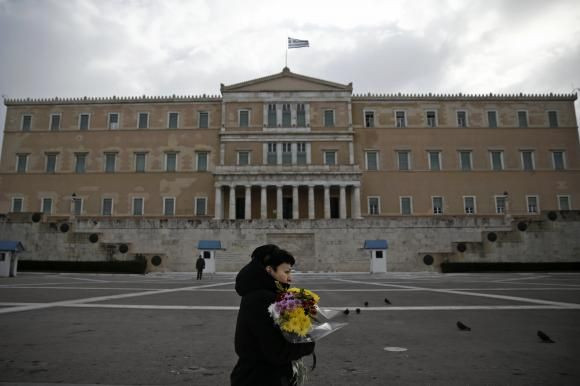Greece Says Will Submit Loan Extension Request On Wednesday

(Reuters) - Greece's government confirmed it would ask on Wednesday for an extension to its loan agreement with the eurozone, which it distinguishes from its full bailout program, but faced strong opposition from Germany.
The new government refuses to seek an extension of the EU/IMF bailout program, which is due to expire on Feb. 28, because of its demands for austerity policies, but wants to renegotiate Greece's debts separately.
Government spokesman Gabriel Sakellaridis stressed the request would cover only the debt issue.
"Let's wait today for the request for an extension of the loan contract to be submitted by Finance Minister (Yanis) Varoufakis," he told Antenna TV when asked if an initial draft text rejected at a meeting of euro zone finance ministers this week would form the basis of the proposal. "All along deliberations are going on to find common ground. We want to believe that we are on a good path. We are coming to the table to find a solution."
A source close to the government said on Tuesday that Greece would ask for an extension for up to six months of the loan agreement on conditions to be negotiated.
However, the proposal has met with a cool initial reception. German Finance Minister Wolfgang Schaeuble dismissed the Greek effort on Tuesday, telling broadcaster ZDF: "It's not about extending a credit program but about whether this bailout program will be fulfilled, yes or no."
Despite the German opposition, debt markets took the Greek comments as a positive sign that the radical left-wing government could reach a deal with the euro zone, averting the risk that Greece might be forced out of the common currency.
Yields on Greek and other lower-rated euro zone bonds fell on Wednesday, with investors also encouraged the country might win some respite for its banks from the European Central Bank.
The ECB is expected later in the day to approve emergency funding for Greek banks that have lost deposits at an unnerving rate, easing selling pressure on the country's assets.
"The market is taking the view that an agreement between Greece and EU is more likely than not, hence fears of a Greek exit have dissipated somewhat, so we're seeing appetite for riskier markets including peripherals," said Nick Stamenkovic, a strategist at RIA Capital Markets.
Asked what the Greek government will do if Germany did not back down from its position, Sakellaridis said: "The government hopes that it will not come to such a point and it is working for such a scenario so that it will not find itself again in such a situation similar to the last Eurogroup."
© Copyright IBTimes 2024. All rights reserved.




















